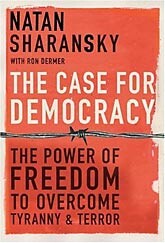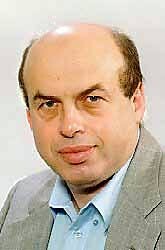The Electronic Intifada 16 December 2004

(Photo: White House)
Ron Kampeas, writing on JTA, “The Global News Source of the Jewish People,” on December 14, 2004, reports that President Bush’s views of the Middle East have been formed by Israeli Minister Natan Sharansky’s book, “The Case for Democracy: The Power of Freedom to Overcome Tyranny and Terror.” If true, this story is just one more example of the poor sources of information used by the current US administration.
There is much to be said in favor of the promotion of democracy in the Middle East, both as an end in itself and as a means to starve the roots of terrorism. The Palestinians themselves have been trying for years to move towards a more democratic system. If Israel were really concerned about having a democratic state as a neighbor, rather than a client state or a series of Bantustans, it would have treated the Palestinians very differently over the past half century, and would not now, even as government spokesmen assure the US that they will do everything possible to facilitate elections, act behind the curtain to sabotage the process. [1]
The Palestinians are, and have been for more than 35 years, under the guns of a hostile occupation. Over that period they have been increasingly surrounded by illegal settlers, some of them frank terrorists, many others opportunistic thieves who will take every opportunity to rob, injure, and kill their neighbors. They have been strangled in every way by discriminatory regulations and zoning. They continue to be subject to Israeli incursions (often by Israelis disguised as Arabs) and arbitrary arrests, assassinations, home demolitions, and loose open-fire regulations. A whole generation of potential homegrown democratic leaders has been murdered, arrested, or forced into exile. If they succeed, in the short run, in forming any sort of democracy under these conditions, let alone merely a reasonably functional government that is able to respond to not only to Israeli demands for security but to the needs of its own citizens, including those who have been most traumatized and dispossessed, they will be the first people in the entire history of the world to do so.

Sharansky is now one of the die-hard opponents of disengagement, favoring an imposed military settlement and permanent occupation of settlements, all settlements, or as many as politically possible. He is one of the most self-serving, line-toeing spokesmen of the Israeli right one might find, even placing himself, in a Ha’aretz interview, among those who make the laughable claim that the Palestinians are merely “the descendants of those Arabs who migrated in the last 200 years.” [3]
In the same interview, Sharanaky is promotes the pretense by the religious Zionist right that disengagement or any removal of settlements would be “ethnic cleansing,” and that if two states are produced:
…we are speaking about the coexistence of very different types of societies - one a democratic Israel and the other a dictatorship based on racial cleansing. I don’t believe in this type of peace and this was one of my main objections to the disengagement plan
He is an ardent supporter of Israel’s West Bank Barrier, calling for it to be constructed deep within the West Bank, and claiming that it is entirely defensive in nature, when it can easily be shown that the route attempts, wherever possible, not only to seize as much land as possible right now but to facilitate future land grabs. [4]
At the time of Camp David, Sharansky, Yitzhak Levy, and Eli Yishai were referred to as the “Sheli Coalition.” This coalition opposed the talks and afterwards cooperated to helped overthrow Barak. According to Sharansky, at Camp David “Barak offered the Palestinians everything they desired.” [5]

Israeli Minister Natan Sharansky
As Minister of Diaspora Affairs Sharansky has been a frequent spokesperson for Zionism in the US, and a disingenuous one, because people assume that, having survived the gulag, he must be on the side of “our” enlightened values. He’s not. If he’s not a downright anti-Arab bigot and racist, and he may be, he’s certainly a Zionist apologist. It is disturbing to consider that Israel has created a portfolio for a minister who would blur the distinction between Jews who have chosen to perform aliya and those who have chosen not to do this and who would try to speak in their name — and then has staffed it with a man who chastises American Jews for not standing 100% behind Israel and its pro-settlement policies. [9]
As a result of his diapora involvement Sharansky is now head of the Global Anti-Semitism Forum which puts forth the idea that almost any criticism of Israel is anti-Semitism. This has been debunked by Adam Keller, among others. Meanwhile his forum is deeply involved in the prejudiced efforts of Daniel Pipes’ Campus Watch and the David Project to limit freedom of expression and require a specious ‘balance’—as determined by rightist Zionists—through silencing academics who do not toe the Israeli-Zionist line [10]
To give him credit, and this is the only credit one can easily give this man, he did grow up in the Soviet Union, and managed to form, while there, some good ideas about the desirability of freedom of expression, justice, a more democratic society, and so on. But because he grew up subject to anti-Semitic prejudice and repression, it was easy for him to swallow the whole Zionist line about the Palestinians. He even blames the Arab world for the fact that Israel did not promote democracy among the Palestinians when it had the chance, over the 26-year period preceding the Oslo agreement.
As the Kampeas piece makes clear, in calling for “free speech; free press; freedom to organize politically, religiously and socially; an end to incitement; and the dismantling of refugee camps” before the Palestinians are ready for “elections towards statehood,” Sharansky reveals his true colors: either he is completely disingenuous or he has no familiarity at all with Palestinian society:
1. He tries to impugn the Palestinians for lacking religious freedom when their society has long been a tolerant, pluralistic one where Muslims, Christians, and Jews lived happily side by side, and still do.
2. He implies that the Palestinians are at fault for an inciteful educational system, an old Zionist canard and propaganda of the most hateful sort. It ignores the fact that the Israelis forced Palestinian schools to use Jordanian and Egyptian textbooks from 1967 to Oslo when the PA began to develop better ones. It also ignores the fact that almost anything anyone can say about Palestinian textbooks can be found mirrored in Israeli textbooks. [11]
3. He essentially trashes Palestinian society for not allowing freedom of expression, following the Israeli line that every Palestinian publication is a ‘mouthpiece’ and anyone who dares to speak up is dead meat. Clearly he imagines the place to be another Soviet Russia.
4. He calls for the ‘dismantlement’ of refugee camps, especially in Gaza. What is he is talking about? Who operates the bulldozers in Gaza, constantly creating more homeless refugees? Who is making it difficult for Palestinians to build new homes, and dismantling them if discriminatory zoning has made it impossible to obtain building permits? Who is making it difficult even for Israeli Arabs, also subject to discriminatory zoning, to build new homes or live where they please? The only way to ‘dismantle’ refugee camps in Gaza, already the most overpopulated place in the world, would be to allow those in them to move to Israel, clearly not what Sharansky has in mind.
Is this the man whose ideas Bush ponders as he thinks about Middle East policy?
Susan Hussein is a member of the Department of Classics and General Humanities at Montclair State University in Montclair, New Jersey, teaching courses in Greek history and literature and women’s history. She is a founding member of the New Jersey Coalition for Peace with Justice in the Middle East, and the author of letters to a number of newspapers, including the New York Times. She has visited the northern West Bank four times for periods of up to four months, and was married there in 1965, thus having familiarity with the Nablus area and surrounding villages both before and after the 1967 occupation. Her most recent visit predated the current intifada by about a month, and she is in weekly contact with her many relatives there.
Footnotes
1. Khalid Amayreh, Al-Jazeera, 12 December 2004, as made available by the Electronic Intifada.
2. As reported by the Israeli Insider, 6 October 2004.
3. Interview in Ha’aretz, 24 June 2004.
4. For a recent example, among many: Aluf Benn and Arnon Regular, writing in Ha’aretz, 14 December 2004.
5. On the ‘sheli coalition,’ Uzi Benziman, writing in Ha’aretz, 15 December 2004. Sharansky’s words quoted from his own anti-disengagement opinion piece, Ma’ariv, 23 April 2004.
6. Akiva Eldar in Ha’aretz, 21 February 2002.
7. Reported by The Other Israel, 29 May 2001.
8. “Dreams of Land Collide as Israeli Settlers Grow,” Tim Golden, New York Times, 4 July 2002.
9. “World Jewry is not an amen chorus,” Arthur Herzberg, Ha’aretz, 7 January 2004.
10. Amiram Barkat in Ha’aretz, 29 October 2004.
11. “Learning all the wrong facts,” Akiva Eldar, Ha’aretz, 9 December 2004.


